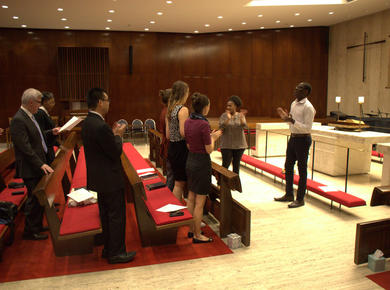Posted: May 31, 2017
New York, USA – Right outside the window from my desk at the MCC UN Office on the 10th floor of the Church Center for the United Nations, I can see the UN entrance and the Kenyan flag, which unexpectedly brews the feeling of patriotism; I am learning to appreciate my country more when I am not in it.
Back home, I attend Eastleigh Fellowship Center, a Mennonite church within the capital, Nairobi. My parents are both leaders in the Kenyan Mennonite community. Growing up, the notion of peace was strongly embedded in me and this informed my decision to pursue international relations as a field of study in university.
In 2015, I completed undergraduate studies in international relations at the University of Nairobi where I discovered an interest in diplomacy and how it can be informed by theology; that is, how I can apply biblical values and Anabaptist principles to diplomatic strategies in a politically charged environment. So when I came across the MCC UN Office intern placement in MCC’s call for new IVEP participants, I concluded it would be the perfect placement for a Mennonite from the Global South seeking to make a difference in world affairs.
I had spent four years learning about the UN in great detail, but there’s a big difference between learning about an institution in rhetoric and in practice. In the MCC office, I’ve discovered advocacy work isn’t as pretty as I had thought it to be. It requires a lot of research and coordination amongst ourselves: Doug Hostetter, director and my supervisor, Kati Garrison, program and advocacy associate, and Emma Cabana, Mennonite Volunteer Service intern. At our Tuesday one-hour staff meeting, we have rotating staff-led worship and all give updates on what we are working on. As a new intern, I chose country-specific priorities including DPRK (North Korea), Israel and Palestine.
Challenges
I am new to advocacy work and so attending meetings of NGO (non-governmental organization) working groups on Israel/Palestine and the Security Council was uncharted waters, full of challenges
1. Limited experience
International relations, as a field of study, only gives you an overview of how the international system works. Delving more into it, I had to reconcile the information I had obtained from my studies with information on the ground.
2. The feeling of oblivion
In the working groups, consisting of well-informed representatives of NGOs, I would often feel unable to contribute anything, not by choice but because I’m still learning the content. But, the more I attended meetings, the more I understood.
3. Integrating into existing relationships
Working at the Church Centre for the United Nations was more communal than it was professional. Integrating myself into the close networks among organizations and their staff was challenging; but I learned to form my own relationships and merge them into the larger community.
The whole experience working at the MCC UN Office and within the UN community has been frustrating, enlightening, fulfilling and rewarding both professionally and spiritually.
On a professional level, I’ve learned a great deal of how advocacy work permeates the international agenda. Thus equipped, I will now be able to seek ways of locally applying the knowledge I’ve acquired to help my church, community and country in furthering peace and humanitarianism.
As a Mennonite, I know peace is intrinsic and that it should be pursued through nonviolence. The greatest challenge has been trying to incorporate these beliefs into a politically motivated organization. When certain countries want to use violence to curb conflict, MCC and some other faith-based NGOs have worked hard to offer nonviolent ethical alternatives for peacebuilding. . Though difficult, working within the MCC UN Office has taught me that reconciling my beliefs as Mennonite with the challenges of international politics is possible.
—Moses Osiro of Kenya is the IVEP/MWC intern at the MCC UN Office (2016–2017).
Seeking Latin American applicants for the 2018-2019 MWC/IVEP internship at the MCC UN Office
Applicants must be a member of a church affiliated with the MWC, be single and 25–30 years of age. They must be fluent in English, committed to peace and justice in international affairs and have had university-level studies in international affairs, political science, sociology, history, theology or related disciplines. They must have personal practical experience in humanitarian, interfaith or justice/peace work at the local, national or international level.
The candidate will complete an IVEP application form from an MCC office in the candidate’s country. The application deadline is in October 2017 for the 2018-2019 internship.



Comments: